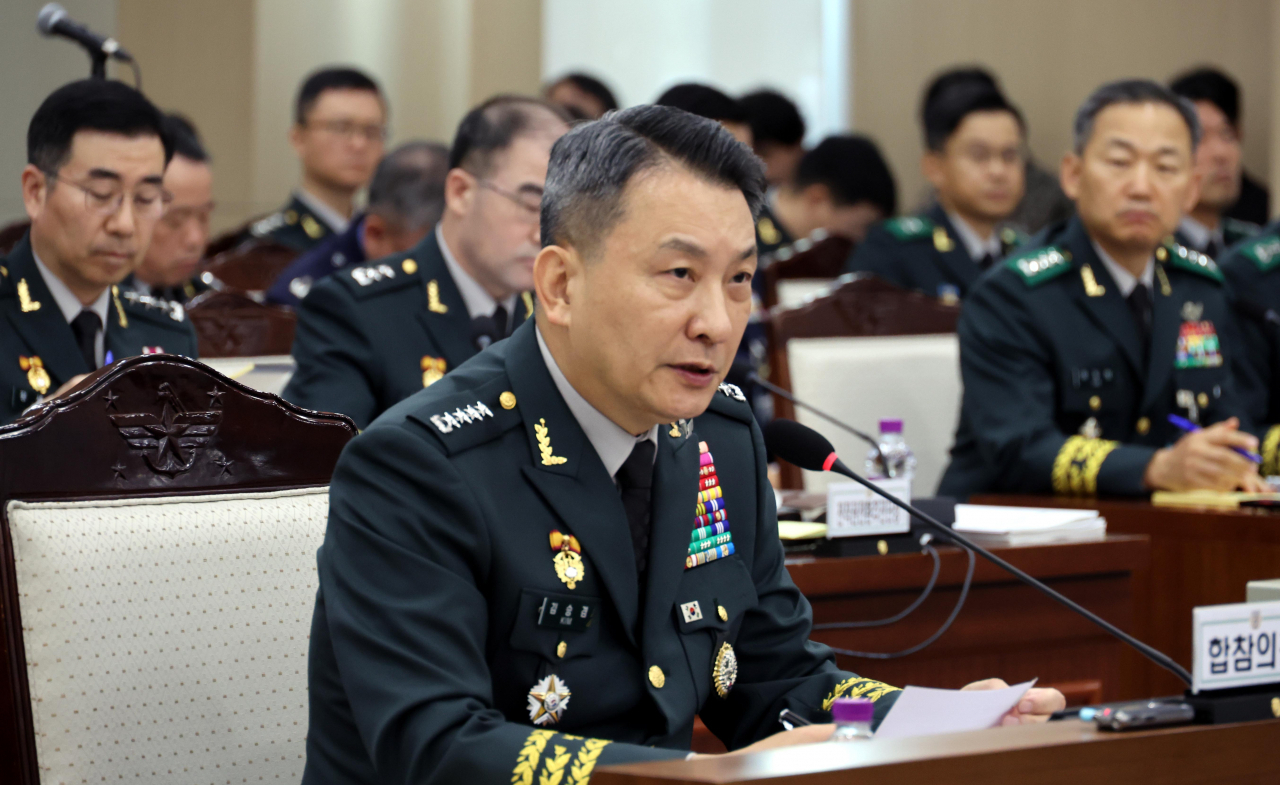JCS chief says 2018 military accord restricts S. Korea's surveillance of N. Korea
By YonhapPublished : Oct. 12, 2023 - 21:07

A 2018 military tension reduction agreement with North Korea restricts South Korea's surveillance of the North due to no-fly zones set along the heavily fortified border under the deal, the chairman of the Joint Chiefs of Staff (JCS) said Thursday.
Gen. Kim Seung-kyum made the assessment during a parliamentary audit, as newly appointed Defense Minister Shin Won-shik has been pushing to suspend the 2018 agreement signed when then-President Moon Jae-in traveled to Pyongyang for summit talks with North Korean leader Kim Jong-un.
"Due to no-fly zones set under the military agreement, our surveillance range is restricted in terms of time and space," Kim said during the audit of the JCS, when asked if the military accord has limited the spy planes' flight range.
The September 19 agreement called for setting up buffer zones along land and maritime borders and creating no-fly zones to reduce military tension. Pyongyang has violated the agreement 17 times until the end of last year and 15 violations occurred last year alone, according to the defense ministry.
"The September 19 military agreement has affected surveillance and reconnaissance and the current operational readiness. The agreement was aimed at easing tension and building trust, but doubts have arisen due to (North Korea's) advancing nuclear and missile programs," Kim said, taking note of the need to reconsider its effectiveness.
Kim evaluated the Palestinian military group Hamas' surprise attack on Israel succeeded in the early stage of the conflict through "various, manipulative tactics and strategy," saying South Korea faces a different type of security threat from North Korea.
"The way Hamas invaded Israel has many implications as North Korea could wage a war in a similar way in the future," he said.
Hamas unleashed a barrage of some 5,000 rockets on Israel last Saturday, with some of them bypassing Israel's Iron Dome air defense system, despite its known interception rate of 90 percent.
The attack has brought renewed attention to South Korea's military capabilities for countering the threats posed by North Korea's artillery positioned near the border, which is known to be more powerful than Hamas' rockets.
According to Kim, the North is estimated to have some 700 long-range artillery pieces, with about 300 of them evaluated to pose a threat the Seoul metropolitan area, home to about half of the country's 51.5 million people.
"Our military confronts an adversary equipped with different military capability from Hamas. (The South Korean military) is maintaining firm warfare capabilities that can retaliate against any provocations by the adversary and aggression immediately, strongly and until the end," the four-star general said.
Kim said South Korea has been putting resources to achieve "peace through strength" amid Pyongyang's advancing missile and nuclear threat and uncertainties surrounding the regional security.
"Through close coordination with the United States, the South Korean military has been increasing the extended deterrence capabilities of the South Korean-US alliance and the three-axis system to enhance our ability to deter and respond to North Korea's nuclear and missile threats," Kim said.
The JCS chief said there are plans to conduct a trilateral air exercise with the United States and Japan near the Korean Peninsula as part of efforts to expand security cooperation. If held, it would mark the first of its kind around the peninsula.
In response to a lawmaker's remark that such efforts could be seen as a military alliance between the three countries, Kim said there have been no considerations for an alliance with Japan but noted the importance of the neighboring country if a conflict were to arise.
"If war breaks out on the Korean Peninsula, I believe support from Japan, a friendly nation that is closest to us, will be considerably needed," he said.
In a policy report, the JCS said it will beef up the operational capability of the country's "three-axis" defense system against North Korea.
The system includes the Korea Air and Missile Defense system, which involves the long-range surface-to-air missile system and an improved version of the mid-range surface-to-air missile system, as well as an operational plan to incapacitate the North Korean leadership in a major conflict and the Kill Chain pre-emptive strike platform.



















![[Today’s K-pop] Treasure to publish magazine for debut anniversary](http://res.heraldm.com/phpwas/restmb_idxmake.php?idx=642&simg=/content/image/2024/07/26/20240726050551_0.jpg&u=)